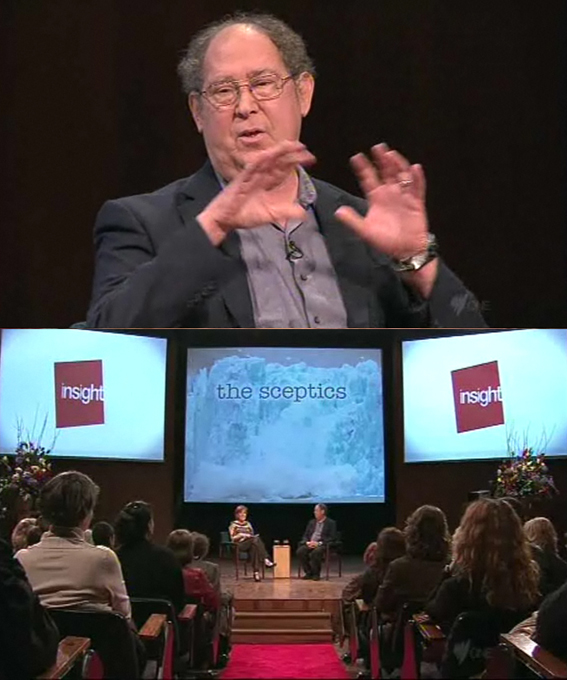Besides being one of the world’s leading climate scientists, Stephen Schneider had deeply-felt humanitarian convictions. His experience of taking his climate concerns to the wider public should alert us to the real climate challenge: getting ordinary people engaged in reducing our carbon footprint. [14 September 2010 | Peter Boyer]
On the day last week when we finally secured a new national government, SBS TV’s Insight program featured US scientist Stephen Schneider fronting an audience of Australians who’d declared they were sceptical about man-made climate change.
The program had been recorded when Professor Schneider was in Australia in June. Within weeks, aboard an airliner about to land in London, he suffered a fatal heart attack.
Schneider, a 40-year veteran of climate science, won multiple awards and plaudits for his lifelong efforts to bring science to the people. He worked by the rule that his research was public property and that he had an obligation to explain to the public the outcomes from his and other’s work.
Scientists who do this, he once wrote, must always explain the science behind their assertions. In doing so, they must differentiate between objective and subjective statements, and between scientific issues (“what can happen”) and value choices (“what to do”).
In his final public forum in Australia, Schneider dealt carefully and respectfully with his inquisitors as they put to him the queries that were troubling them, acknowledging their “great questions” and seeking to give each answer the full benefit of his experience.
At the end, when host Jenny Brockie asked whether any minds had been changed, a couple of hands went up in an audience of over 50, leaving the vast majority unconvinced. Viewer responses on the SBS blogsite confirmed that when it comes to climate, minds don’t change all that often.
Schneider’s responses to questions provided some reasons for this. Scientists can’t determine everything, he said: “It is not a scientist’s job to judge the risks; it’s only our job to report them.” We keep demanding simple, obvious answers for something that’s neither simple nor obvious.
But there are deeper and I think more pertinent reasons why people harbour doubts and resist proposed actions, which have nothing to do with science and everything to do with us — the way we are. If our climate is complicated, so is humanity, only more so.
In discussing climate issues with Tasmanians, I’ve learned that everyone’s thoughts are part of the mix, including objections to what scientists say. If we think we’re fixing the problem simply by “correcting” people who aren’t in accord with current scientific wisdom, we need to think again.
To fully understand climate change, says a major 2010 report by the American Psychological Association, we need to go beyond science. We also need to grasp psychological and social processes — how we react as individuals and communities to a troubling or uncertain outlook.
One of the authors of that report presented a keynote paper on psychology and climate change at the recent International Congress of Applied Psychology in Melbourne. The subtitle of Joseph Reser’s address covered it all: “Environmental wisdom amidst complexity, disconnects, and crucial omissions”.
Reser, of Griffith University, Queensland, argues that while the climate debate is starting to address national and social implications of mitigating and adapting to climate change, it’s all but ignoring psychological aspects — the internal resilience of individuals in the face of big uncertainties.
While most people see climate change as an important issue for the world, it doesn’t rate in how they live their own lives. Reser argues that the “think global, act local” idea needs to include strong personal images, so that people see the health of the biosphere as their local responsibility.
Reser says people are being stressed by this disjunct between global and local; they hear all the talk but see no clear direction for personal action. My own observation is that the anger and frustration shown by some in the SBS Insight audience was an expression of this stress.
When people feel powerless they shut down and get on with the business of life — perfectly natural adaptive behaviour, Reser says. If we understood people’s sense of powerlessness and the personal distress it causes in individuals, then we could start to do something about it.
Such thinking could be used to justify Julia Gillard’s pre-election proposal for a citizens’ assembly, but any benefit of such a protracted consultative process is far outweighed by the precious time it would consume. In the lead-up to a carbon price scheme, government itself must take the initiative to help individual people find their own personal pathways to a low-carbon future.
One idea being thrown around is to use role models such as a contracted celebrity in a publicity campaign, but where better to start than government itself? The last election campaign broke all travel and spending records, with blanket advertising campaigns and senior MPs criss-crossing the country at mind-boggling pace.
Governments have been free with advice, but very short on example. Leaders, ministers and the senior bureaucrats under them need to start working and living as if they’re serious about cutting carbon emissions, like cutting travel, using public transport, implementing energy-saving regimes. Extend that to business CEOs and we’re getting somewhere.
Stephen Schneider deserves the last word. At the end of his Insight forum he talked of the stresses faced by ordinary folk struggling to deal with climate and the impact of government policies. “You can’t just hang them out to dry,” he said. “You’ve got to do something.”

